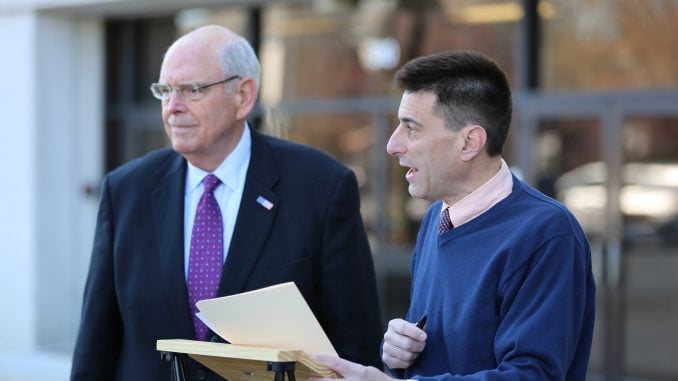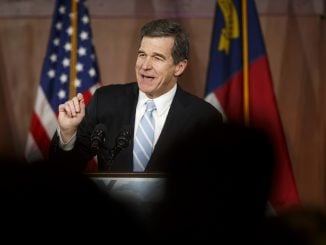
RALEIGH – Under “extreme objection,” the executive director of the N.C. Republican Party, Dallas Woodhouse, testified in a deposition for nearly two hours on Monday. His appearance was required by subpoena from the N.C. Democratic Party that also “commanded” him to turn over internal party documents including emails, written political plans, texts, payroll records and his personal calendar information.
The NCGOP filed requests to quash the subpoena, but the effort was not addressed by the court in time.
“It is hard to imagine information that is more confidential and proprietary than the political strategy of a political party concerning the winning of elections in a current cycle,” the NCGOP’s motion read.
The subpoena stems from a lawsuit by the NCDP over changes to the 2018 judicial primary. The suit was filed against N.C. Senate Leader Phil Berger (R-Rockingham), House Speaker Tim Moore (R-Kings Mountain) and Kim Strach, executive director of the N.C. Bipartisan State Board of Elections and Ethics Enforcement. Democrats also deposed their own executive director, Kim Reynolds, in the case.
The NCGOP was not named in the suit, but the subpoena solicits communication on the elimination of judicial primary elections in 2018. Outraged, Woodhouse invited media to attend the deposition saying that he wanted witnesses to the “kangaroo court” proceedings.
“I really do wish they would just simply try to beat us at the ballot box,” he said before walking into the Raleigh law offices of Poyner Spruill, representing the N.C. Democratic Party.

“It’s extremely easy to think of this as just sort of inside baseball, or whatever, but when you think about it, political parties and political campaigns have a purpose in our society,” Woodhouse said. “If the rival political party can grab somebody and try to make them reveal conversations and information, or threaten them with contempt of court for not complying … the system can collapse.”
NCGOP Chairman Robin Hayes argued that Democrats are on a “fishing expedition” that is unconstitutional and jeopardizes valuable trade secrets and party strategy. He says that the maneuver not only negatively impacts the Republican Party in the 2018 elections, it could set a precedent that impacts future campaign operations for all parties.
“Lawyers for the North Carolina Democratic Party have threatened Republican Party leaders with contempt of court charges that could carry possible jail time if Party leaders do not reveal sensitive political information,” said Hayes in a statement. “This includes a wide range of political documents such as e-mails, text messages, payroll records, charts, and calendar records in an unconstitutional fishing expedition. This was designed to cripple the NCGOP’s ability to conduct operations going into the fall elections, and threaten the ability of all political parties to operate in the future.”
The challenge faced by Republicans if they comply with the Democrats subpoena is that their private conversations, strategy, emails and other information would be a part of the public record — accessible to the N.C. Democratic Party, despite the long history of generations of candidates speaking candidly with the state party about their campaigns.
“As a leader of the Young Republicans and a candidate for the North Carolina General Assembly, I worry about the long-term implications of one political party, forcing another to reveal confidential information,” said Catherine Whiteford, a candidate for the N.C. House 34 seat, in a statement released by the NCGOP.
Democrats are seeking to block parts of a law that canceled the 2018 judicial primaries while the General Assembly examines a way to update the judicial district lines. Lawmakers say they canceled the 2018 judicial primaries because they wanted to allow newly eligible candidates to be able to get a closer look at what could be new judicial district maps or other changes that stem from the work of the new committee.
Democrats say it’s a Republican-led effort to turn the courts more to the right. Woodhouse says the NCGOP’s role, and his own as its executive director, is political and has nothing to do with the legislative actions. He called the subpoena corrosive to the state’s political process.
“I did five congressional district conventions this week driving across the state talking to all kinds of candidates about all kinds of issues,” Woodhouse said. “Why would they ever want to talk to you if they think that the conversations they have with you can be revealed to the other side?”
The N.C. Democratic Party did not respond to requests for comment.




